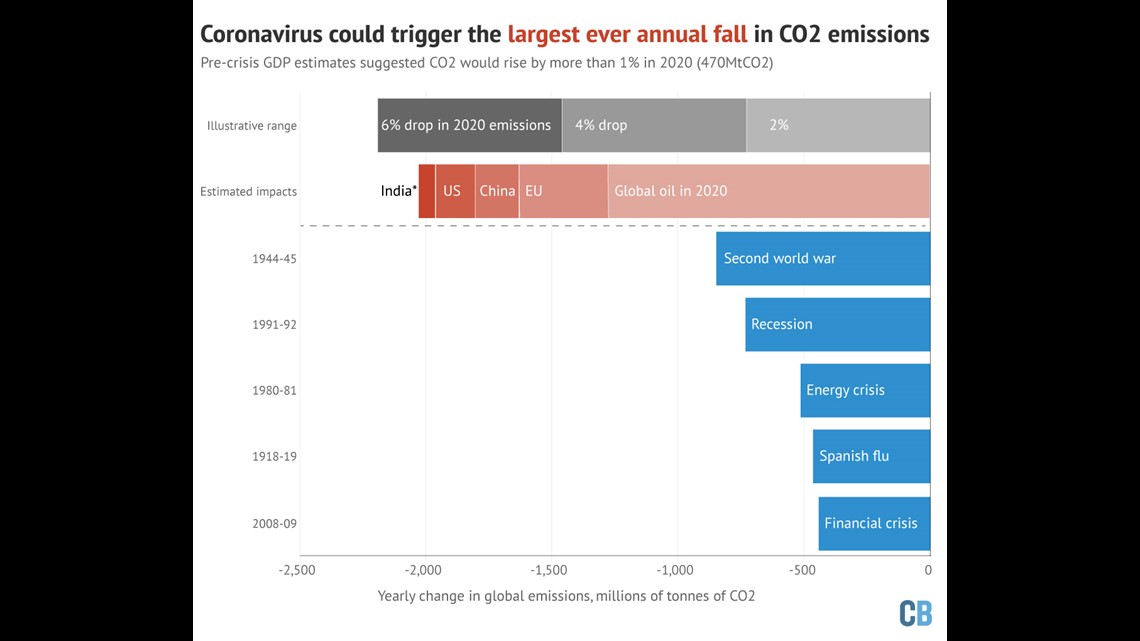WASHINGTON — Question:
Has the coronavirus had an impact on the environment?
Answer:
Absolutely. Various experts told the Verify team that air pollution and carbon emissions are significantly down. However, the changes are unlikely to last past the pandemic.
Sources:
Dr. Bryan N. Duncan: Atmospheric Scientist at NASA Goddard Space Flight Center
Simon Evans: Climate Journalist for Carbon Brief
Peter DeCarlo: Johns Hopkins University
Process:
The streets surrounding the Capitol are usually bustling with cars and tourists. But during the coronavirus pandemic, the streets remain mostly empty.
The same can be said about communities across the country, from Bourbon Street in New Orleans to Times Square in New York City. As emissions plummet, it only makes sense that the air quality would improve.
To find out whether this premise is true, the Verify team spoke with three experts on the subject, starting with Dr. Bryan Duncan, an atmospheric scientist at the NASA Goddard Space Flight Center.
Duncan said the impacts of this pandemic can literally be seen from space. He shared a satellite image of the Northeastern section of the United States, measuring nitrogen dioxide levels this past March compared to past years; emissions were down by roughly 30%.
"That's a huge drop," Duncan said.
According to a NASA article on the subject, nitrogen dioxide is primarily emitted from the burning of fossil fuels and "can be used as an indicator of changes in human activity."
"When I see this large decrease, I don't see it as a good thing," Duncan said. "I see it as reflecting something going on the ground that's not positive."
The Verify team also spoke with Simon Evans, a climate journalist with Carbon Brief. Evans took on a highly ambitious project to estimate the total reduction in global carbon emissions, as a result of the coronavirus.
"It's actually really hard to come by good real-time data, or close to real-time data," Evans said. "And so we had to meld together a bunch of different sources covering different sectors."
That data included oil projections and electrical demand numbers, collected from international agencies such as the US Energy Information Administration, International Energy Agency, and ICIS.
Using this data, Evans estimated that there would be a drop of 2,000-million metric tons of carbon emissions in 2020. That would be equivalent to approximately 5.5% of the global total in 2019.


"This is going to be the biggest reduction in annual carbon emissions ever recorded by more than double," Evans said.
And yet, the reduction would not be enough to reverse the effects of climate change. Evans wrote that emissions would need to fall by approximately 7.6% every year this decade "in order to limit warming to less than 1.5 celsius above pre-industrial temperatures."
"That just illustrates the enormity of the challenge," Evans said. "To tackle emissions and avoid dangerous climate change."
To read a thorough analysis, click here.
Lastly the Verify team spoke with Peter DeCarlo, from the Johns Hopkins University, who is an expert on air quality. He emphasized that these massive changes are all temporary.
"This isn't going to last forever," he said.
DeCarlo explained that carbon emissions can stay in the atmosphere for 100 years or more, making these temporary drops in emissions less significant.
"A few months, maybe even a year of reduced emissions, is really a small change when you think about the lifetime of CO2," he said.
The good news, according to DeCarlo, is that we should be able to feel the impacts of less air pollution immediately.
"The air is going to be cleaner," he said. "You hopefully can breathe a little easier. You might not notice it. But your body notices it."

